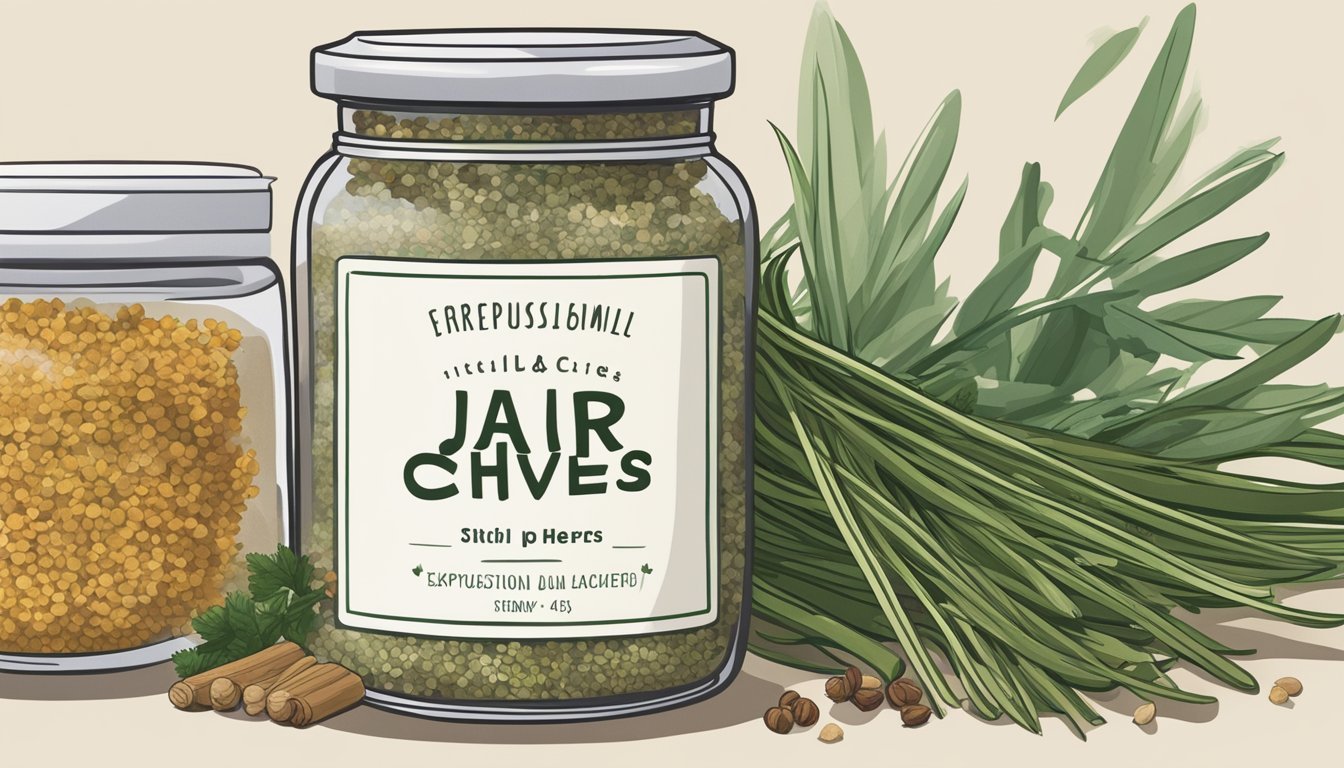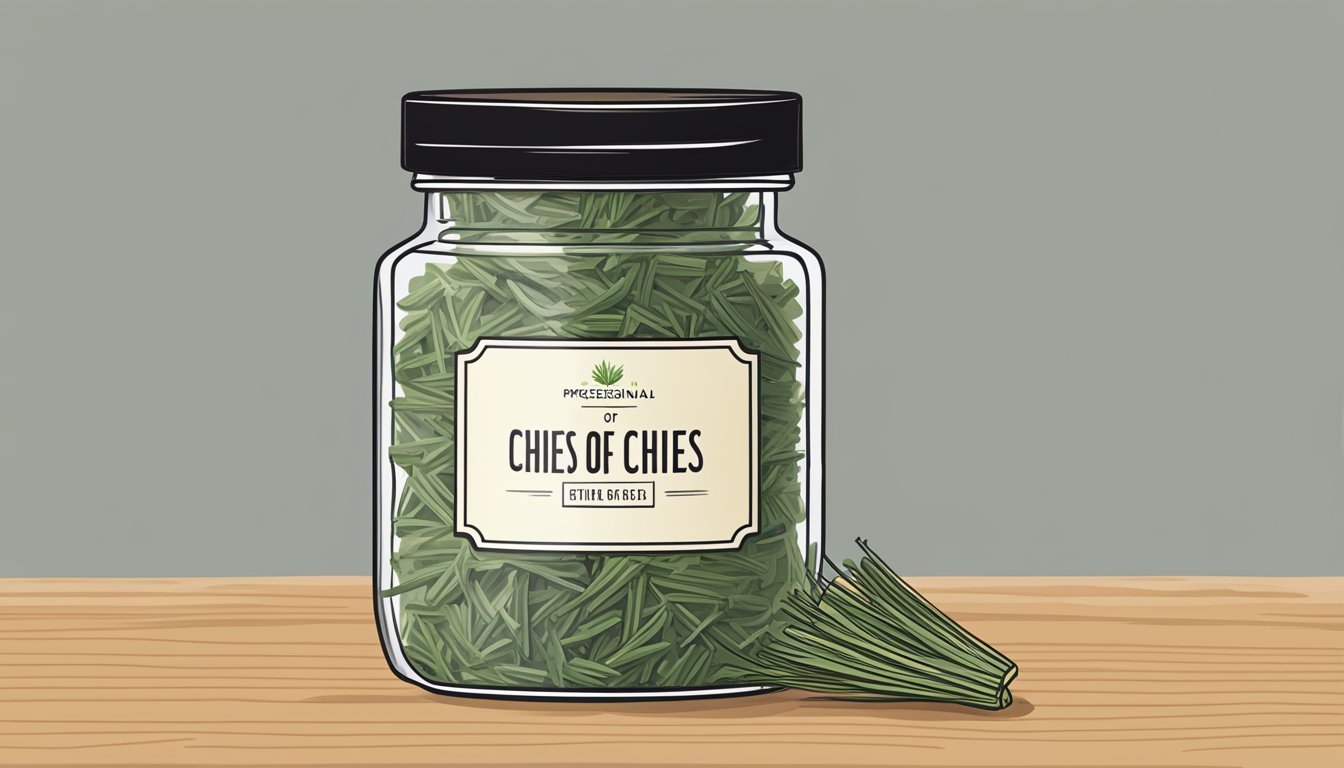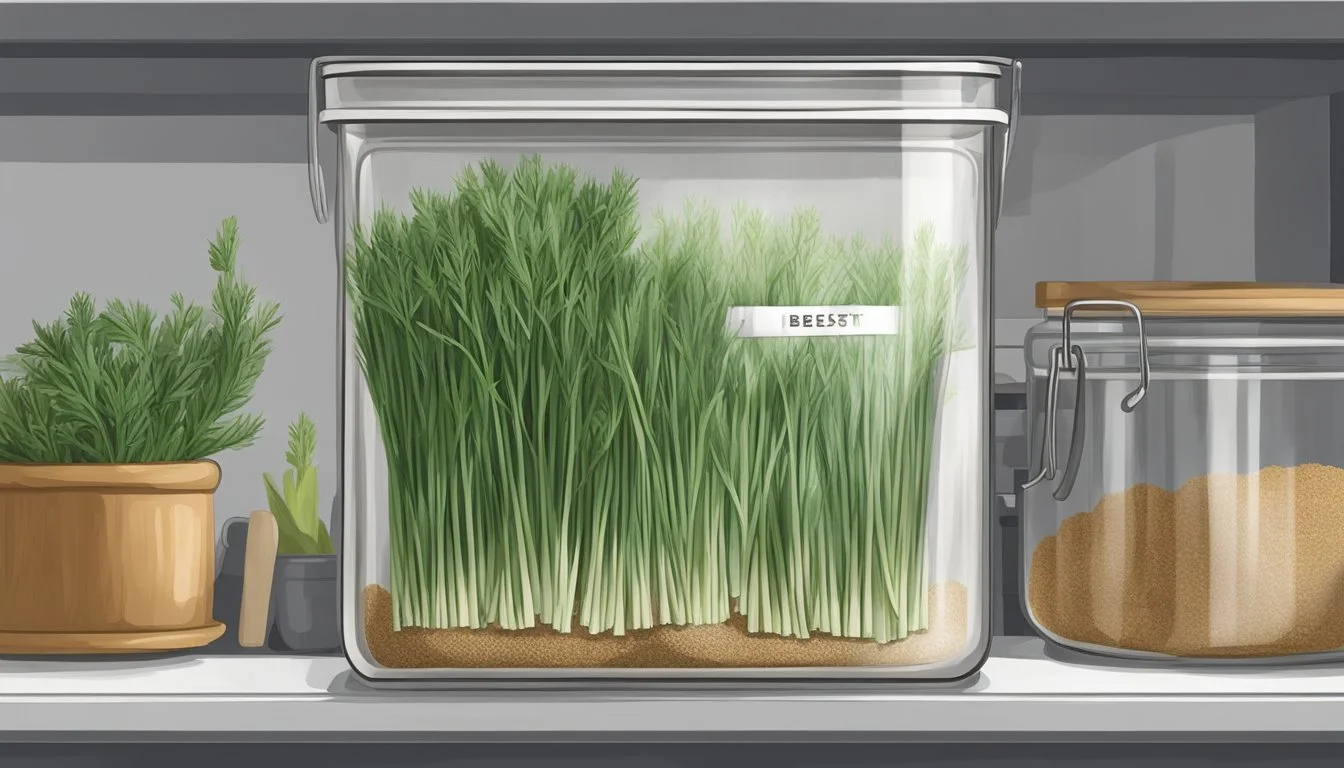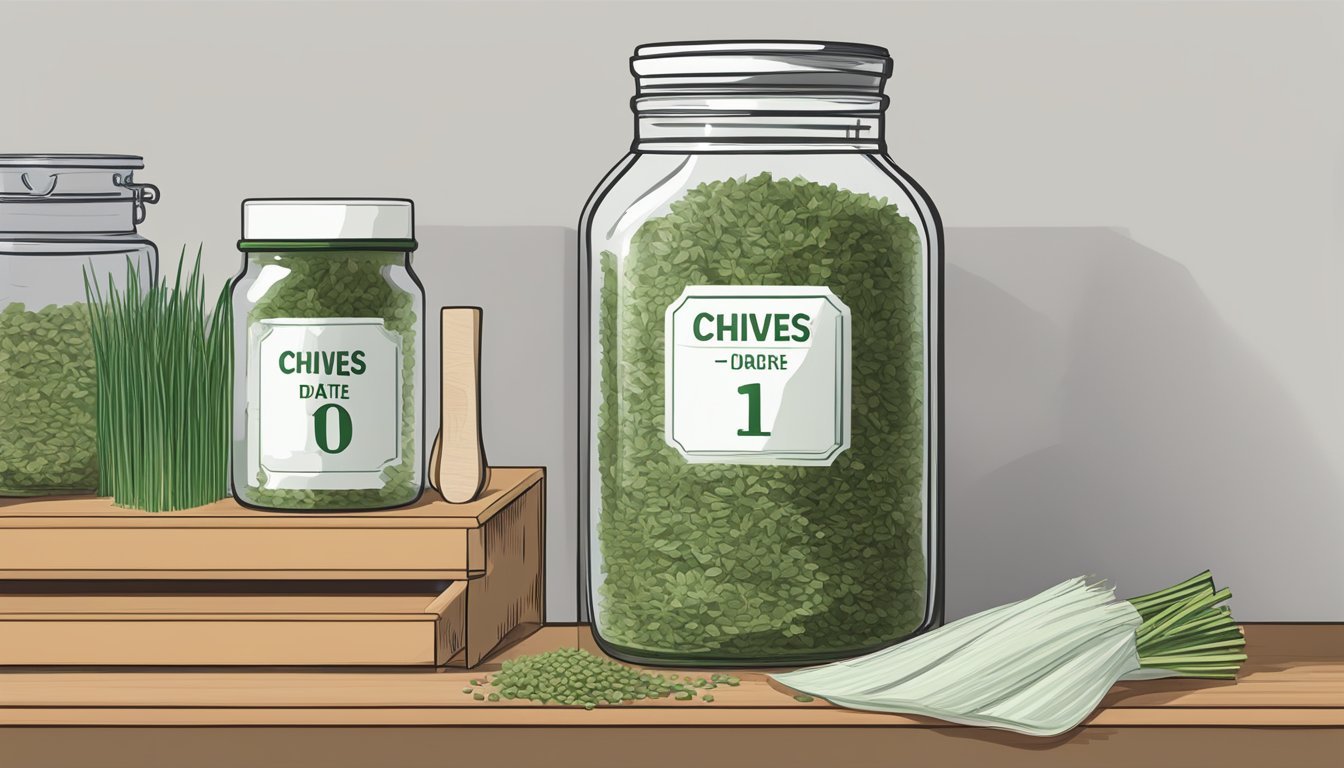How Long Do Dried Chives Last?
Shelf Life and Storage Insights
Dried chives (how long do dried chives last?) offer a convenient and long-lasting alternative to their fresh counterparts, ideal for those looking to maintain a stocked pantry of herbs. The shelf life of dried chives is noteworthy; when stored properly, they can maintain their best quality for about two to three years. The key to preserving their longevity lies in storage conditions—keeping them in a cool, dry place away from any direct sources of light and moisture is imperative.
The flavor of dried chives, while less pronounced than fresh, still provides a useful culinary substitute in dishes where the herb's mild onion-like taste is desired. Over time, the potency of dried chives can diminish, so using them within their optimal period ensures the best taste and aroma in recipes. Additionally, the color of dried chives, which should remain vibrant green if they are still fresh, is a visual indicator of their quality.
To maximize the use of dried chives, proper storage practices should be employed. Transferring the herb to airtight containers after opening can help retain flavor and prevent spoilage. Observing changes in smell, color, and flavor can also help determine if the dried chives have surpassed their prime and should be replaced to maintain the integrity of the dish they are used in.
Understanding Dried Chives
Dried chives are known for retaining much of the taste and aroma of their fresh counterparts, while offering a long shelf-life and convenience in the kitchen. They are an edible, perennial herb rich in certain nutrients.
Properties of Dried Chives
Taste and Aroma: Dried chives have a mild onion flavor that is less potent than fresh chives but still distinctive. The dehydration process concentrates their aroma, providing a subtle, yet savory note to dishes.
Shelf Life and Potency: When stored properly, dried chives maintain good quality for about 2 to 3 years. Their potency, however, might decrease over time, which may require an adjustment in the amount used for cooking.
Nutritional Content: Dried chives contain some Vitamin C and Iron, though these nutrients may diminish during the drying process.
Culinary Uses
Flavor Enhancement: They are used to enhance the flavor of various dishes, including soups, stews, and sauces.
Garnishing: Their bright green color makes them a visually appealing garnish.
Substitute for Fresh Chives: Dried chives serve as a convenient substitute for fresh chives, especially when the fresh herb is out of season or unavailable.
Health Benefits
Dried chives offer several health benefits, due to their nutritional content:
Vitamin C: They provide Vitamin C, which is essential for immune system function and skin health.
Iron: The presence of iron in dried chives contributes to the production of red blood cells and prevention of anemia.
Proper Storage Methods
To ensure the longevity and potency of dried chives, proper storage methods are critical. The use of suitable containers and maintaining ideal conditions will significantly affect their shelf life.
Choosing the Right Containers
When storing dried chives, one should opt for airtight containers to prevent moisture and air from compromising the herbs' quality. Glass jars with tight-sealing lids or vacuum-sealed bags are excellent choices. It is pivotal that the containers are thoroughly cleaned and completely dried before housing the chives to avoid introducing any moisture that could lead to spoilage.
Ideal Storage Conditions
Dried chives should be stored in a cool, dry place such as a pantry or cabinet away from heat sources and sunlight. Temperatures should be consistently low to prevent the chives from losing their flavor and aroma. Additionally, ensuring that storage containers are kept away from environments with fluctuating humidity levels is equally important for preserving the chives' quality.
Shelf Life and Freshness
Understanding the shelf life and freshness of dried chives is crucial for both culinary quality and safety. This section details methods for determining when chives are still usable and strategies to maximize their longevity.
Determining Freshness
Visual and Olfactory Indicators: To test the freshness of dried chives, one should inspect their color and aroma. Fresh dried chives typically exhibit a vibrant green hue and a potent, aromatic scent. Fading color or a lackluster smell often signals that the chives are past their prime.
Taste Test: As a further test, a small taste can confirm if the chives retain their characteristic flavor. A noticeable decline in flavor intensity indicates diminished freshness.
Extending Shelf Life
Optimal Storage Conditions:
Temperature: To preserve their freshness, dried chives should be kept at room temperature, ideally between 60-70°F (15-21°C).
Environment: A cool, dry place away from direct sunlight is imperative to maintain quality and extend shelf life.
Proper Packaging:
Containers with tight-fitting lids help protect the dried chives from moisture and air exposure, which can compromise their freshness.
Using opaque containers can also protect against light degradation.
Refrigeration: Although not typically necessary for dried herbs, storing dried chives in the refrigerator can offer added freshness preservation, especially in humid conditions.
By following these storage practices, the longevity of dried chives can reach up to 2 to 3 years without significant loss of quality.
Signs of Spoilage
When it comes to dried chives, there are distinct signs that can alert one to spoilage. Identifying these indicators early ensures that one avoids using compromised herbs in their cooking.
Visual and Olfactory Indicators
Color: Dried chives should maintain a green hue similar to when they were first dried. Discoloration, such as browning or fading, signals that the herb may be past its prime.
Smell: Fresh dried chives will have a mild, onion-like aroma. Any changes in smell, or the development of an off odor, are indicative of spoilage.
Preventing Mold and Mildew
To prevent mold and mildew, which signify significant spoilage, dried chives must be stored in a dry, airtight container. If one observes any fuzzy growths on their dried chives, this is a clear sign that they should no longer be consumed.
Culinary Applications
Dried chives offer a convenient way to infuse meals with a subtle onion-like flavor, making them a versatile ingredient in a variety of recipes. Their mild taste allows them to blend seamlessly without overpowering other ingredients.
Enhancing Dishes and Sauces
Dried chives can be effortlessly incorporated into numerous dishes to enrich their flavor profile. They are often stirred into soups and mixed into sauces where they impart a delicate herbaceous note. Because of their versatility, dried chives enhance the taste of:
Cream-based soups
Gravies and cream sauces
Salad dressings
To maximize their flavor, it's advisable to add dried chives at an intermediary stage of cooking, allowing them to hydrate and release their aroma into the dish.
Creative Garnishing
Apart from their use as a seasoning ingredient, dried chives serve as an excellent garnish due to their vibrant green color and tender texture. Here are a few ways in which they can elevate the presentation and taste of various foods:
Salads: A sprinkle of dried chives on top of a fresh salad provides a punch of color and flavor.
Baked Potatoes: Offering a slight crunch, they're a classic topping for baked potatoes, either alone or as part of a sour cream blend.
Baking: Dried chives are also baked into breads and pastries, creating an appealing savory element.
Teas: For an aromatic twist, dried chives can be steeped in hot water to create a mild, savory tea.
When garnishing, it's best to apply dried chives closer to the end of the preparation to retain their visual appeal and subtle taste.
Preservation Techniques
Preserving dried chives properly enhances their shelf life and maintains their flavor. The following subsections cover two effective preservation methods: drying and dehydrating, as well as freezing for longevity.
Drying and Dehydrating
Drying chives is an efficient way to extend their usability. They should be dried until no moisture remains, which typically takes a few hours in a dehydrator or in an oven set to the lowest temperature. Once fully dried, chives should be stored in airtight containers to protect them from moisture and light. When stored in a cool, dry place away from direct sunlight, properly dehydrated chives can last up to three years.
Freezing for Longevity
Freezing chives is another method to preserve their fresh flavor. Chives should be chopped to the desired size and then spread out on a baking sheet to freeze individually. Once frozen, they can be transferred to airtight containers or resealable freezer bags. Frozen chives maintain a better texture and flavor compared to dried and can last in the freezer between one to two years. Freezing chives is ideal for recipes where the herb will be cooked, as they lose crispness upon defrosting.
Usage Tips and Tricks
Dried chives retain a mild onion-like flavor and offer a versatile herb for various dishes. When stored correctly, they can last up to three years. To make the most out of dried chives, one should consider how to maximize their flavor and what alternatives could substitute them if unavailable.
Maximizing Flavor
Store Properly: Keep dried chives in a cool, dry place in an airtight container to retain their savory yet slightly sweet taste.
Add Late: Introduce dried chives later in the cooking process to preserve their delicate flavor.
Rehydrate: For some recipes, rehydrating dried chives in a little water can help revive their taste.
Substitutes and Alternatives
Fresh Chives: When freshness is needed, use fresh chives as a 1-to-1 substitute for dried.
Other Herbs: In the absence of chives, use alternatives like green onions or leeks for a similar mild, onion-like essence.
Tarragon or Parsley: For a different yet complementary taste, tarragon offers an anise-like flavor while parsley contributes a fresh taste with a hint of bitterness.
Frequently Asked Questions
In this section, we provide answers to common inquiries regarding the storage and culinary uses of dried chives, ensuring that they retain their flavor and are used effectively in dishes.
Storage FAQs
How should one store dried chives to maximize their shelf life?
Dried chives should be stored in a cool, dry place, away from direct sunlight and moisture. Ideally, they are kept in airtight containers or sealable bags.
Unopened containers: Up to three years.
Opened containers: Use within six months to maintain quality.
Is it possible to freeze dried chives for extended storage?
Yes. Freezing can help extend their shelf life, though it is not necessary if properly stored in a pantry.
Culinary FAQs
How do dried chives compare to fresh chives in terms of flavor?
Dried chives are less potent than fresh chives and have a more concentrated flavor. They are best rehydrated before using or added to dishes with moisture.
What dishes are dried chives best suited for?
Dried chives are well-suited as a seasoning for soups, stews, and creamy sauces, where they can impart a subtle onion-like flavor without overwhelming the dish. They can also be used similarly to herbs like parsley or pepper for added flavor.
Ensuring Best Quality
To maintain the best quality of dried chives, proper storage conditions are crucial. These delicate herbs, part of the onion family, are often used to enhance the flavor of creamy dips, dishes, and various preparations. Ensuring optimal freshness and potency involves taking specific steps to protect them from elements that can degrade their quality.
Storage Conditions:
Location: Store dried chives in a dark cupboard, away from exposure to sunlight. Light can diminish the herb's vibrant color and potency.
Temperature: Avoid areas of direct heat. A cool, dry place is ideal for preventing the breakdown of essential oils within the chives.
Container Specifications:
Lids: Utilize containers with tight-fitting lids to keep air and moisture out. These enemies of dried herbs can lead to a loss of flavor and potential spoilage.
Material: Glass or metal containers are preferable as they do not retain odors and are less permeable than plastic.
Maintenance Tips:
Inspection: Regularly check the chives for any signs of moisture or spoilage. Clumping can indicate that unwanted moisture has entered the container.
Replacement: Due to loss of flavor over time, it is advisable to replace dried chives every six months to a year, even though they may remain safe to consume for up to three years.
Utilization:
Rehydration: For recipes requiring the texture of fresh herbs, chives can often be rehydrated. However, this is best done just before use to prevent any deterioration of texture or flavor.
Refrigeration: While not necessary for dried herbs, some choose to refrigerate chives to extend their shelf life. If doing so, ensure the container is airtight to prevent the chives from absorbing fridge odors.
Final Thoughts
In assessing the longevity of dried chives, it's essential to recognize that their shelf life is significantly extended when compared to their fresh counterparts. Unopened containers of dried chives can confidently be expected to retain quality for up to three years given they are stored in a cool, dry place, shielded from light and moisture. Once opened, however, it is advisable to use them within six months to safeguard their taste.
A decline in flavor and aroma can signal that the dried chives are past their prime. This can manifest as a more subdued scent and a lack of the distinctive sharp, onion-like taste that chives are renowned for. It’s not just taste that is affected—older dried chives may experience wilting and a change in color, becoming less vibrant.
Storage is a critical factor in extending the shelf life of dried chives:
Cool, Dry Place: Retards the growth of moisture-loving bacteria.
Airtight Containers: Preserves flavor and prevents spoilage.
One should remain aware that the taste can never quite match the intensity of fresh chives, yet properly preserved dried chives serve as a convenient and suitable substitute. For a discerning editor or consumer, these factors are crucial in maintaining the desired quality and ensuring dried chives are used effectively within their optimal period.








